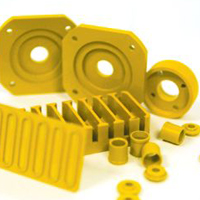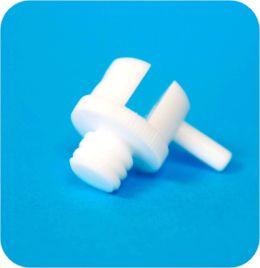[vc_row][vc_column][vc_column_text]
PAI Material (Polyamide-Imide)
PAI or polyamide-imide is one of the most resistant polymers on the market today. It draws its notoriety from its resistance. Without additives, polyamide-imide has the ability to withstand extreme temperatures. This material remains unchanged even when exposed to a temperature of 270°C.
Polyamide-imide or PAI is also very resistant to chemical attack and wear. In addition to its extraordinary strength and rigidity, this material has the advantage of being dimensionally stable. The expansion of PAI is 0.025 mm/m/° compared to 0.012 mm per meter for metal. Its water absorption property is 0.3% every 24 hours.
In addition to its good resistance to radiation, polyamide-imide is intrinsically non-flammable. When exposed to fire, this polymer also has a particular advantage: it emits very little smoke. Known among other things for its machinability, PAI or polyamide-imide is distinguished by its ability to retain its characteristic mechanical properties. This polymer retains this important quality even at particularly high temperatures.
All these characteristics, especially its strength, explain why polyamide-imide is mainly used for the creation of parts intended to be subjected to extreme conditions. PAI, or polyamide-imide, can be used to manufacture balls, bearing cages and gears with tight tolerances. This plastic is used in particular in the aerospace industry. PAI is also in great demand in the nuclear industry.
The most common commercial name for this polymer is Torlon PAI from Solvay
Do you need more information? Contact us!
[/vc_column_text][/vc_column][/vc_row][vc_row el_class=”gridprod”][vc_column][vc_row_inner equal_height=”yes”][vc_column_inner width=”1/3″][vc_single_image image=”5755″ img_size=”full” alignment=”center”][/vc_column_inner][vc_column_inner width=”1/3″][vc_single_image image=”5754″ img_size=”full” alignment=”center”][/vc_column_inner][vc_column_inner width=”1/3″][vc_single_image image=”5753″ img_size=”full” alignment=”center”][/vc_column_inner][/vc_row_inner][/vc_column][/vc_row][vc_row][vc_column][vc_column_text]
Our other materials
[vc_row content_placement=”middle” css=”.vc_custom_1582391804648{padding-top: 50px !important;padding-bottom: 50px !important;background-image: url(https://www.plastiques-nobles.com/wp-content/uploads/2020/01/classification-des-matieres-plastiques-plastic-material.jpg?id=6188) !important;background-position: center !important;background-repeat: no-repeat !important;background-size: cover !important;}” el_class=”bandplastique”][vc_column][vc_column_text]
Need help finding your plastic?
Do not hesitate to use our search engine and our interactive pyramid.
[/vc_column_text][vc_btn title=”Find your plastic” align=”center” link=”url:%2Fplastic-classification%2F|||” el_class=”btn3″][/vc_column][/vc_row]
[vc_row full_width=”stretch_row” css=”.vc_custom_1579189110761{padding-top: 50px !important;padding-bottom: 40px !important;background-color: #f4f5f8 !important;}”][vc_column][vc_column_text]
A question, a quote?
Do not hesitate to contact us at +33 (0) 1 48 45 49 79 or via this form:
[/vc_column_text]
[/vc_column_text][/vc_column][/vc_row][vc_row][vc_column][vc_column_text]
[/vc_column_text][/vc_column][/vc_row]





















